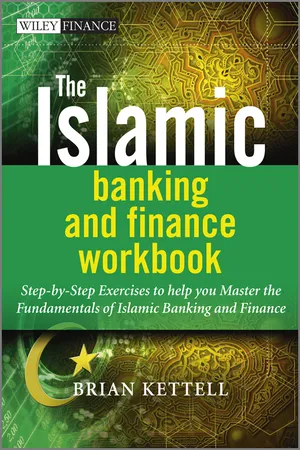
The Islamic Banking and Finance Workbook
Step-by-Step Exercises to help you Master the Fundamentals of Islamic Banking and Finance
- English
- ePUB (mobile friendly)
- Available on iOS & Android
The Islamic Banking and Finance Workbook
Step-by-Step Exercises to help you Master the Fundamentals of Islamic Banking and Finance
About this book
The Islamic Banking and Finance Workbook is a one-of-a-kind workbook on the topic, enabling readers to test their understanding of Islamic banking and finance concepts. Although suitable as a standalone learning tool, the book is designed to test the information covered in the companion book, Introduction to Islamic Finance and Banking, and covers the fundamentals of Sharia'a law, the Islamic contracts interpretations and definitions, Murabaha, Mudaraba, Musharaka, Istisna'a, Salam and Ijara modes of finance, Takaful and much more. Emphasis is placed on mini case studies, multiple choice questions and tests of the basic concepts. It also includes a full answer key and brief chapter summaries, as well as learning objectives.
The Islamic Banking and Finance Workbook is an essential learning tool for students and practitioners who want to test their knowledge of the rapidly growing world of Islamic banking and finance.
Frequently asked questions
- Essential is ideal for learners and professionals who enjoy exploring a wide range of subjects. Access the Essential Library with 800,000+ trusted titles and best-sellers across business, personal growth, and the humanities. Includes unlimited reading time and Standard Read Aloud voice.
- Complete: Perfect for advanced learners and researchers needing full, unrestricted access. Unlock 1.4M+ books across hundreds of subjects, including academic and specialized titles. The Complete Plan also includes advanced features like Premium Read Aloud and Research Assistant.
Please note we cannot support devices running on iOS 13 and Android 7 or earlier. Learn more about using the app.
Information
- Describe the role played in Islam by the Prophet Mohammed.
- Explain the Islamic five pillars of faith.
- Describe zakat.
- Define the Islamic creed.
- Explain how one becomes a Muslim.
- Distinguish zakat from sadaqah.
- Describe Salat.
- Explain the Islamic belief in angels.
- Describe the hajj.
- Explain the Islamic belief in Qada'ar.
- Describe the Shahada.
- Explain the Islamic belief in the Apostles.
- Define the Ulema.
- Explain the importance of Ramadan to Muslims.
- Describe Tawhid.
- Define imam.
- Contrast the hajj with the umra.
- Explain the Islamic belief in the Hereafter.
- Explain the Islamic belief in the revealed Books.
- Test that you have fully understood the Islam beliefs that drive Islamic banking.
- The Qur'an: For Muslims, the Qur'an is the ‘Word of God’. Muslims believe the identical book is in Heaven and Allah sent the angel Gabriel to Mohammed to reveal his ‘Word’. The Qur'an is divided into 114 chapters or Surahs. These Surahs are revelations given to Mohammed during his 23 years of ‘Prophethood’ from AD 610 to 632.
The Qur'an, composed during Mohammed's lifetime, corresponds to the time and circumstances of his life. The Surahs can be divided into three time periods. The earliest are the shortest and known as Early Meccan, and date from AD 6...
Table of contents
- Cover
- Series
- Title Page
- Copyright
- Dedication
- Preface
- About the Author
- Chapter 1: What Do You Know About Islam?
- Chapter 2: Sources of Sharia'a Law and the Role of Sharia'a Boards
- Chapter 3: Principles of Islamic Banking and Finance
- Chapter 4: The Murabaha Contract as a Mode of Islamic Finance
- Chapter 5: The Mudaraba Contract as a Mode of Islamic Finance
- Chapter 6: The Musharaka Contract as a Mode of Islamic Finance
- Chapter 7: The Ijara Contract as a Mode of Islamic Finance
- Chapter 8: The Istisna'a Contract as a Mode of Islamic Finance
- Chapter 9: The Salam Contract as a Mode of Islamic Finance
- Chapter 10: Takaful: Islamic Insurance
- Glossary
- Bibliography
- Index